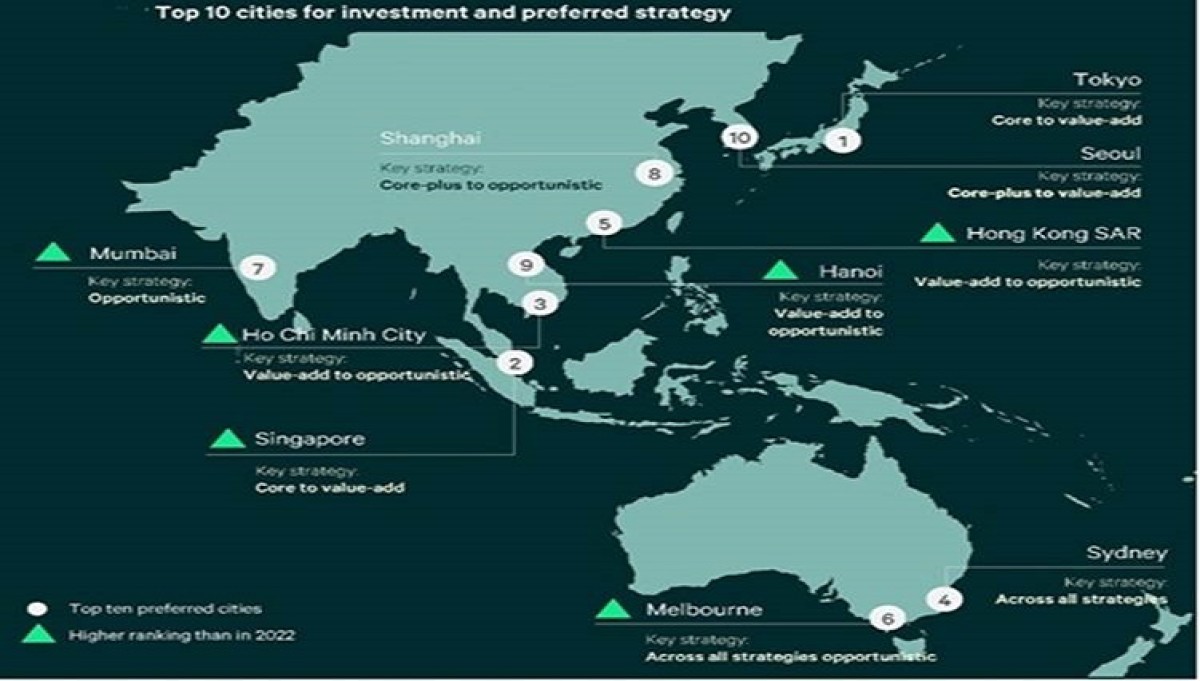Mumbai ranks 7th among the top 10 APAC cities in Investor Intentions survey 2023
CBRE, the world’s leading real estate consulting firm, today announced the findings of its, 2023 Asia Pacific Investor Intentions Survey. According to the survey, Mumbai is ranked 7th among the 10 APAC cities and emerged as a preferred destination for cross-border investment in the region. Mumbai ranks ahead of Shanghai (ranked #8), Hanoi (ranked #9) and Seoul (ranked #10) on the list. No other Indian city had featured in the list in the last two years. Tokyo topped the chart for the fourth consecutive year as the target market for cross-border investment, followed by Singapore. Vietnam continues to benefit from its status as a “China-plus One” destination. Mumbai (ranked #7) and Shanghai (ranked #8) continue to be focus for long-term investors looking to add to their real estate exposure in the world’s two biggest emerging economies.
The survey covered all asset classes, finding that nearly one-third (31%) of investors will target opportunistic strategies, distressed assets, and non-performing loans this year to take advantage of current market conditions.Anshuman Magazine, Chairman & CEO - India, South-East Asia, Middle East & Africa, CBREsaid, “Real estate sector in India has remained resilient throughout 2022. Despite the challenging times, businesses have looked at India as an attractive, resilient, and cost-effective investment destination. Indian economy is likely to remain a key driver of global growth in 2023. Investment activity in real estate surged to an all-time high in 2022, with Mumbai, Delhi – NCR, cumulatively accounting for 56% of the investments in 2022.We expect Capital flows likely to remain
steady in 2023.”
Greg Hyland, Head of Capital Markets, Asia Pacific, CBRE, said, “Despite healthy fundraising levels, most investors are adopting a cautious approach as they look for signs of yield expansion and the interest rate tightening cycle to stabilize. We expect investment activity to accelerate in the year's second half.”
Dr. Henry Chin, Global Head of Investor Thought Leadership & Head of Research, Asia Pacific, CBRE“Industrial and logistics continues to be the most preferred asset class for Asia Pacific investors, followed by office and residential. The survey finds that core investors still opt for offices as their top choice. Investors are showing much stronger interest in the residential sector, especially multifamily/built to rent. We expect yields to expand further across all asset classes in 2023.”
As per the survey, more than 60% of investors expect to find discounts in retail and Grade A offices in 2023. Despite logistics being the most preferred asset class, only 11% of the investors are willing to bid above the asking price this year, compared to 35% in 2022.
Note: ‘2023 Asia Pacific Investor Intentions Survey’, polled more than 530 Asia Pacific-based investors across a range of investor types from developers, private investors, and REITs to institutions such as insurance companies, pension funds and sovereign wealth funds, which asked respondents a range of questions regarding their buying appetite and preferred real estate strategies, sectors and markets for 2023.
Other key highlights from the survey include (conducted in November and December 2022):
• The majority (93%) of institutional investors expect allocations to real estate to increase or remain stable in 2023.
• Investors cite the fear of a recession, interest rate hikes and a mismatch in buyer and seller expectations as their greatest challenges this year.
• Investors prefer high quality assets in prime locations across all sectors, as these assets have strong tenant demand drivers and resilient cash flow.
• Only 5% of investors say they will invest in alternative sectors, with healthcare-related properties, including life sciences and medical offices, the most preferred, overtaking data centres for the first time.
• Around 60% of investors intend to use ESG criteria in making investment decisions. On the other hand, 40% plan to delay their ESG adoption due to increased costs and current economic conditions.
















Leave a comment